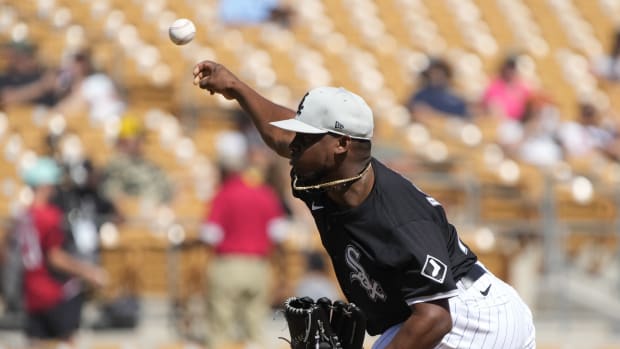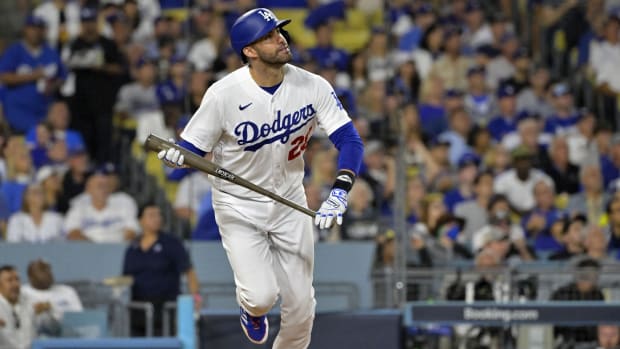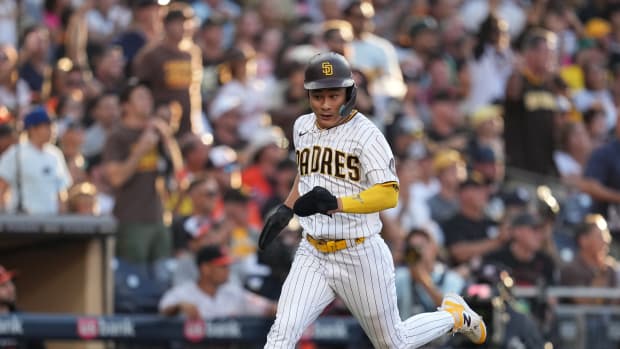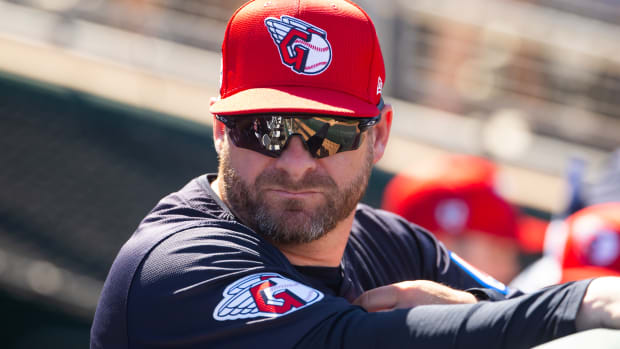Red Sox Win Marathon ALCS Game 4 in Wild Fashion to Close in on World Series
Here are three thoughts after Wednesday night’s ALCS Game 4 at Houston’s Minute Maid Park, in which the Red Sox beat the Astros 8-6 to take a three games to one lead.
We came for a baseball game, and we got a psychological test
Major League Baseball’s 2018 official rules book runs 169 pages long. Early on Wednesday night, all attention was focused on page 67, which contains Rule 6.01(e): Spectator Interference, along with an explanatory comment. The comment reads:
There is a difference between a ball which has been thrown or batted into the stands, touching a spectator thereby being out of play even though it rebounds onto the field and a spectator going onto the field or reaching over, under or through a barrier and touching a ball in play or touching or otherwise interfering with a player. In the latter case it is clearly intentional and shall be dealt with as intentional interference as in Rule 6.01(d). Batter and runners shall be placed where in the umpire’s judgment they would have been had the interference not occurred.
No interference shall be allowed when a fielder reaches over a fence, railing, rope or into a stand to catch a ball. He does so at his own risk. However, should a spectator reach out on the playing field side of such fence, railing or rope, and plainly prevent the fielder from catching the ball, then the batsman should be called out for the spectator’s interference.
With one out and a man on first in the bottom of the first inning, and the Red Sox already leading 2-0, Jose Altuve drove a 91 mile-per-hour fastball from Boston starter Rick Porcello deep to right. Red Sox rightfielder Mookie Betts leapt at the wall, as only Betts can leap. That’s when the trouble began.
Altuve’s shot caromed from the stands back into the field of play. It looked as if it had been a game-tying home run. But rightfield umpire Joe West, from at least 100 feet away, saw it differently. He ruled that a fan–later revealed by the Houston Chronicle to be one Troy Caldwell–had interfered with Betts’s effort to catch the ball, in which case Altuve would be out according to Rule 6.01. Then West and his crew hustled in for a replay review.
The crux of the matter was this: had Caldwell reached over the fence into the playing field, interfering with Betts? Or had Betts reached into the stands, putting himself at his own risk? It was a Rorschach Test, although not a particularly psychologically revealing one: if you concluded the former, you were likely rooting for the Red Sox, and if you believed the latter you were pulling for the Astros.
Unfortunately, the only potentially decisive camera angle was blocked by a security guard, himself leaning over for a view of the play. The umpires had little choice but to uphold West’s ruling, no matter how bad his vantage point had been. The league announced that the call could not be either confirmed or overturned via replay. It simply stood. Altuve was out.
And so this postseason now has its Jeffrey Maier, its Steve Bartman, even if no one will ever know if he actually did anything wrong unless some Zapruder film emerges. “I’m going to need security to escort me out of here if the Astros don’t come back to win this,” Caldwell told the paper.
The did come back. But they didn’t win. The margin was two runs.
There’s no such thing as clutch … but the Red Sox are clutch
The Red Sox held that 2-0 lead in the bottom of the first thanks to a single by Rafael Devers off of Astros starter Charlie Morton. There were two outs.
Xander Bogaerts tied the game at 4-4 in the top of the fifth with a single against reliver Josh James. There were two outs.
Jackie Bradley Jr. put the Red Sox ahead for good with a long home run off of James in the top of the sixth, to make it 6-5. There were two outs.
Brock Holt drew a bases-loaded walk from Lance McCullers Jr. in the top of the seventh, widening the lead to 7-5. There were two outs.
J.D. Martinez looped a single off of McCullers in the top of the eighth, making it 8-5. There were two outs.
Clayton Kershaw Pushes Dodgers Within a Win of Second Straight World Series
Seven of their eight runs, in other words, came with two outs, continuing a trend. They now have 18 two-out runs–nine produced by the bat of Bradley, the No. 9 hitter, alone–in a series in which they’ve scored 25 in total.
That’s 72%.
We are told that clutch hitting–as a repeatable, long-term skill–probably doesn’t exist. In the long run, generally, good hitters will be good in all situations. The Red Sox, clearly, are good hitters. But it’s becoming difficult to deny that they’re at their best when the pressure’s on.
Justin Verlander Looms
Game 5 was supposed to feature a rematch of annual Cy Young candidates, Chris Sale and Justin Verlander, but a stomach illness that sent Sale to the hospital on Sunday forced Alex Cora to push his ace back to a potential Game 6. So Verlander will face David Price on three days’ rest, followed by string of relievers–almost all of whom pitched strenuous innings in Game 4. Craig Kimbrel might not be available at all, after the narrowest of six-out saves, one that was clinched by a miraculous diving catch of an Alex Bregman liner by Andrew Benintendi with the bases loaded and two outs in the bottom of the ninth.
Watch: Mookie Betts Almost Robs Jose Altuve of Home Run, Fan Interference Disrupts Play
The Astros, then, will enter Thursday night with a distinct advantage. Verlander has been typically brilliant this postseason, yielding just four hits over 11 1/3 innings of work. He’s faced the Red Sox–the league’s highest-scoring offense–twice this season, most recently in Game 1 of this series. He’s worked six innings and allowed two runs in each, and has held the Red Sox to a batting average of .125.
“The second time going against a lineup, you need to adjust,” Verlander said on Wednesday. “Or you don't. I don't know. That's kind of one of those times when I like to rely on my instincts when I'm out there and just feel my way through a game.”
Few are better at doing that than Verlander. “I don’t think there’s any difference whether it’s 2-2 or 3-1,” he said early on Wednesday, of the series’ overall score. It will be the latter. But thanks to Verlander, the Astros have a terrific chance of, at minimum, sending this series back to Boston.


































